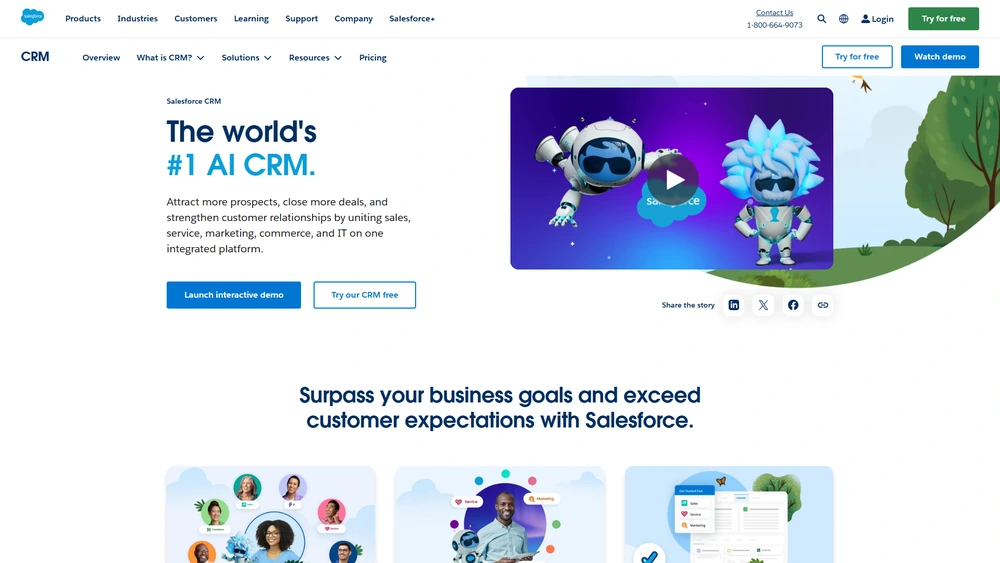Salesforce Sales Cloud Overview & 2026 Industry Position
Salesforce Sales Cloud is a leading customer relationship management (CRM) platform focused on sales performance, automation, and forecasting. As of 2026, it’s widely regarded as the gold standard for enterprise sales teams and fast-scaling businesses that demand intelligent data, robust pipeline management, and deep integration with the broader Salesforce ecosystem. In a world shifting toward AI-first strategies, Sales Cloud integrates generative AI and automation tools to empower reps with predictive insights and real-time engagement triggers—transforming how sales teams operate across industries.
From Launch to 2026: Salesforce Sales Cloud’s Journey
Salesforce Sales Cloud debuted in 1999 as part of the original Salesforce CRM suite. Built on a revolutionary multi-tenant cloud infrastructure, it disrupted traditional on-premise CRM models. Over two decades, the platform expanded through robust APIs, AppExchange extensions, and built-in AI capabilities.
- 1999 – Salesforce launched as a SaaS CRM solution.
- 2005 – Introduction of AppExchange marketplace.
- 2016 – Einstein AI announced, powering Sales Cloud automation.
- 2020 – Dynamic Sales Cadences and Workspaces added for guided selling.
- 2023 – Revenue Intelligence and Slack integration enhance collaboration and forecasting.
- 2025 – AI Cloud for Sales launched, centering the platform around smart automation and real-time data-driven coaching.
2026 Strategy Thesis: In 2026, Salesforce Sales Cloud positions itself as an AI-powered revenue engine—helping sales teams close faster with real-time intelligence and dynamic engagement tools.

Salesforce Sales Cloud Key Features
Salesforce Sales Cloud blends intelligent automation, real-time data, and deeply customizable workflows. Its core features include:
- Pipeline Management: Visual dashboards with drill-down performance data.
- Lead Scoring: AI-powered scoring models surface high-potential leads.
- Opportunity Forecasting: Predictive analytics with Einstein AI.
- Sales Engagement: Automated cadences and email sequences.
- Revenue Intelligence: Real-time analytics via Einstein Activity Capture and Slack.
- Mobile App & Offline Access: Full CRM access and updates on the go.
- Goal Management: Team and individual milestone tracking integrated with broader CRM views.
Workflow & UX
Salesforce Sales Cloud delivers a polished, enterprise-grade experience that balances depth with visual clarity. Tabs are customizable by role, and multiple sales workflows can run simultaneously. The guided selling tools walk users through Discovery → Qualification → Close workflows effortlessly. Einstein-enabled suggestions and Slack-linked updates ensure reps aren’t lost in navigation. While robust, some features may require admin-level customization to optimize fully.
Pro Tip: Use Dynamic Forms to surface the right data fields by lead stage—this reduces clutter and increases form completion rates.
Salesforce Sales Cloud Pricing Analysis & Value Metrics
Pricing as of July 2026 is subscription-based, per user/month (billed annually):
| Plan | Price | Includes |
|---|---|---|
| Starter Suite | $25/user/mo | Basic CRM, contact, account mgmt, email sync |
| Professional | $80/user/mo | Pipeline mgmt, deal tracking, customizable reports |
| Enterprise | $165/user/mo | Workflow automation, forecasting, role hierarchies |
| Unlimited | $330/user/mo | AI insights, 24/7 support, configurable dashboards |
| Einstein 1 Sales | $500/user/mo | All above + full AI Cloud suite and GenAI tools |
Value Score: 8.7/10 for scaling enterprises; Starter is a solid SMB entry point, but ROI shines at Enterprise tier and above using automation and AI.
Competitive Landscape
| Product | Best For | Key Differentiators |
|---|---|---|
| HubSpot Sales Hub | SMB/scale-ups | Free CRM entry, great UI, light automation |
| Zoho CRM | SMBs | Affordable, modular bundles |
| Microsoft Dynamics 365 | Enterprises | Tight Microsoft ecosystem integration |
| Salesforce Sales Cloud | Scaling to enterprise | AI Cloud, deep customization options, partner ecosystem |
Most Common Use Cases
Salesforce Sales Cloud thrives in complex, high-volume, or multilayered sales settings. Ideal use cases include:
- Technology companies managing multi-stage sales cycles.
- SaaS businesses optimizing MRR and client onboarding.
- Manufacturing teams with quoting, invoicing, and forecasting needs.
- B2B companies requiring granular opportunity tracking and team collaboration.
Salesforce Sales Cloud Integrations
Part of Salesforce’s ecosystem, Sales Cloud boasts native integrations across:
- Slack: Real-time alerts and sales collaboration.
- Salesforce CPQ: Quote-to-cash workflows.
- Outlook/Gmail: Email sync and contact enrichment.
- Jira & Trello: Support-to-sales transitions.
- ZoomInfo, Gong, Docusign: Sales data enrichment, coaching, and contracts.
AppExchange: The Salesforce marketplace gives access to 5,000+ prebuilt apps and integrations tailored for nearly every business workflow.
Salesforce Sales Cloud Pros & Cons
- Pros: Best-in-class AI automation, vast customization, powerful ecosystem, enterprise-grade reporting.
- Cons: Learning curve for deep features, high cost beyond Starter tier, admin setup required for optimization.
Final Thoughts
Salesforce Sales Cloud 2025 is a powerhouse CRM platform for businesses prioritizing scale, intelligence, and workflow cohesion. Ideal for teams that need real-time insights and tailored automation, it delivers outsized ROI at the Enterprise tier and above. However, smaller companies may need to weigh its flexibility against learning time and budget. If AI-driven selling, forecasting, and enterprise reliability are priorities, Sales Cloud continues to lead the category.
Salesforce Sales Cloud FAQ
B2B, SaaS, high-touch sales companies, and complex multi-stakeholder industries like finance, healthcare, or manufacturing benefit most.
No. However, the Starter Suite begins at $25/user/month, which is a feature-rich entry point compared to other enterprise tools.
Yes. Through AppExchange, Salesforce offers integrations with QuickBooks, NetSuite, Xero, and more.
Sales Cloud focuses on sales automation, pipelines, and forecasting; Service Cloud is tailored for customer support, cases, and ticketing.
Yes. It offers a native Salesforce mobile app with offline access, task updates, and lead capture functionality.

